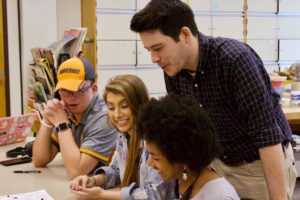While FUTURE does not provide students with a degree from the University of Tennessee, the two- or four-year program results in a vocational certificate from the University of Tennessee.
Students will audit campus courses as well as FUTURE-centered courses. To learn more about the classes, click on the tabs below.
Audit courses for FUTURE students are University of Tennessee undergraduate classes taught by the university’s faculty and staff. These courses give FUTURE students the chance to attend and participate in an undergraduate college course with their peers on topics they find interesting or useful. FUTURE students participate fully in these courses including completing homework, assignments, projects, and exams. FUTURE students are expected to attend every class and follow the same procedures as their peers.
Audit instructors will be given forms listing the necessary modifications for any FUTURE students in their class. These instructors are expected to work with the FUTURE program to help students fully participate and get the most out of the course. This includes sending the academic support specialist any exams that need to be proctored and modifying assignments, due dates, and exams as necessary. The academic support specialist will assist each professor with these modifications.
Instructors are also expected to treat FUTURE students as they would any student in their class. FUTURE students should be given all of the same opportunities and assignments as their peers. Although modifications to these assignments may be necessary, FUTURE students should not be exempt or excluded from any assignments, group projects, or expectations of the class.
Communication with the academic support specialist is another responsibility of audit instructors. The academic support specialist is there to assist professors with any modifications, accommodations, and questions they may have. Keeping the academic support specialist updated with positive and constructive feedback about the student’s success in their class is important to overall student success.

Career and Life Planning provides an in-depth focus on required personal skills that are essential in the workplace. Students focus on skills such as self-awareness, exploring the workplace, connections between academic courses and career planning, and the relationship between personal characteristics and potential career options.
Digital Literacy addresses the many skills required to find, understand, and apply digital information within college and employment settings.
In Life Skills, students focus on the multitude of skills and knowledge needed for self-sufficiency and independence.